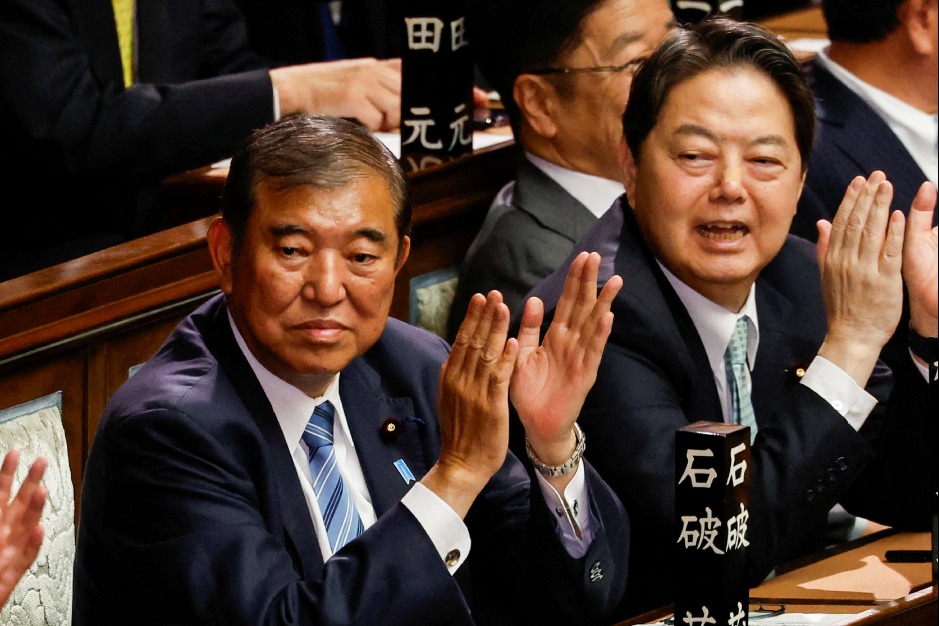Dampened expectations hover over Blinken's visit


Relations: 'Constructive diplomacy' is paramount, expert says
The playing down of expectations by the United States of any breakthrough from US Secretary of State Antony Blinken's upcoming visit to Beijing reflects its domestic politics and the tensions between the two nations, which need to be eased, according to China observers.
"This is not a visit in which I would anticipate a long list of deliverables coming out of it," Daniel Kritenbrink, the US State Department's top diplomat for East Asia, told reporters on Wednesday, a few days before Blinken's visit to China, which is scheduled to start on Sunday.
"This is a really critical series of engagements that we'll have in Beijing at a crucial time in the relationship that we again hope will, at a minimum, reduce the risk of miscalculation so that we do not veer into potential conflict," he said.
Blinken will be the first US secretary of state to travel to China since a brief visit in October 2018 by his Republican predecessor Mike Pompeo.
The top US diplomat's trip is the first high-level follow-up to the in-person meeting between President Xi Jinping and US President Joe Biden in Bali, Indonesia, in November, when they agreed to revive communications, ramp up practical cooperation and put relations on the right course.
Gary Hufbauer, a senior fellow and trade expert at the Peterson Institute for International Economics in Washington, said that sooner is better for the rescheduled trip, as "otherwise, China hawks, such as Congressman Mike Gallagher (who chairs a new US congressional committee on China), completely dominate the news cycle with respect to US-China relations".
White House Indo-Pacific Coordinator Kurt Campbell said that Washington has pursued an approach to Beijing that is competitive without veering into confrontation or conflict, and "intense competition requires intense diplomacy if we're going to manage tensions".
Beijing has said it does not shy away from competition, but opposes featuring competition predominantly in bilateral relations, or defining the relations as a competition.
Ahead of Blinken's planned trip, State Councilor and Foreign Minister Qin Gang said in a phone call with him on Wednesday that the US should "stop interfering in China's internal affairs, and stop harming China's sovereignty, security and development interests in the name of competition".
Hufbauer, the Peterson Institute trade expert, added: "Bilateral competition is inevitable, but it's not inevitable for the US to stress competition in every announcement. Instead, official declarations should stress areas where cooperation is possible."
Blinken's visit to Beijing appears to reflect nothing more than a reaffirmation of a principle that the US has sought to put "a floor" on the relationship — hopefully limiting further damage to the deeply troubled relations, according to Stephen Roach, a senior fellow at the Paul Tsai China Center of Yale Law School.
While doing the minimum is better than nothing at all, it falls well short of the more ambitious agenda that would be required for meaningful and sustained conflict resolution, said the former Morgan Stanley Asia chairman.
"In light of a new round of sanctions and looming restrictions on US investment in Chinese technologies, it is hard to be optimistic that Blinken's long-awaited visit is much of a breakthrough," Roach, author of the book Accidental Conflict: America, China, and the Clash of False Narratives, told China Daily on Wednesday.
"But it certainly beats the alternative of an increasingly worrisome conflict," he added.
In an earlier interview, Roach said he did not expect "any meaningful progress" to arise out of the Blinken trip, as "too much damage has been done in recent weeks and months on the technology front to merit much optimism".
For Roach, the fixation on wordsmanship — that is, splitting hairs between competition and frictions, or between de-risking and decoupling — is only the latest example of the classic "diplomatic doublespeak" that has failed repeatedly to prevent an escalation in US-China tensions.
"We can and must do better than that," he said.
At a time when bilateral relations have reached their lowest point since they were formally established in 1979, the first step in stabilizing relations is "getting back to Bali", according to Graham Allison, the Douglas Dillon professor of government at Harvard University.
This means reviving the high-level dialogue established by the two presidents, who have made a list of actions the two sides could jointly take — in areas such as climate change, public health, agriculture and food security — to reverse this downward trend, Allison wrote in an opinion piece on Wednesday.
Michael Swaine, a senior East Asia Fellow at the Quincy Institute for Responsible Statecraft, said that Blinken's travel is "the latest, welcome effort by Washington to inject stability into a dangerously fraught US-China relationship".
"If Washington and Beijing truly seek to avoid a disastrous conflict, constructive diplomacy designed to stabilize their bilateral relationship is paramount," Swaine wrote in a commentary titled "Stabilize US-China relations — before a 'near miss' turns into a crisis", which was published on Wednesday.
Blinken first visited China in 1996, when he was a member of the National Security Council staff in the administration of then US president Bill Clinton.
He also traveled to Beijing in 2015 as deputy secretary of state under then US president Barack Obama.
Since becoming Biden's top diplomat in January 2021, Blinken has pushed for a threefold China strategy of "invest, align, compete", branding the world's second-largest economy as "the most serious long-term challenge", a categorization that Beijing says is derived from grave misperceptions.

































